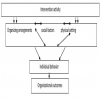Home | ARTS | Management Concepts & Organisational Behaviour
|
Techniques of Japanese Management Practices
Management Concepts & Organisational Behaviour - Japanese Management Practices
Techniques of Japanese Management Practices
Posted On :
In Japan, life-time employment means limited upward mobility. Movement is predominantly lateral through job rotation. Promotions are based on seniority.
Techniques
i. Job rotation and slow promotion
In Japan, life-time employment means limited upward mobility. Movement is predominantly lateral through job rotation. Promotions are based on seniority.
ii. Complex appraisal system
In addition to the output, employees are appraised on the basis of traits such as creativity, honesty, seriousness, maturity and cooperation with others. Employees’ performance in the long run is given more importance, since evaluation is done not exactly on the basis of immediate performance. Employees are naturally motivated to demonstrate loyalty and commitment by their attitudes and actions.
iv.Emphasis on work groups
The Japanese system gives far greater attention to organising tasks around groups than around individuals. Autonomous work teams are constituted. Tasks are assigned to such teams and the group members of the team then decide among themselves the best way for performing the tasks.
v. Open communication
The Japanese system is inherently designed to foster open communication. Job rotation and emphasis on groups means that employees build an informal network that facilitates extensive face to face communication. The physical work setting is also designed to foster communication. People work in cubicles and in open space which facilitate interaction and open communication.
vi. Consensus decision- making
In the Japanese model, the manager while taking decisions discusses them to those who may be affected by the decision. When all are familiar with the proposal, a formal request for a decision is made, and as a result of the previous informal preparations, it is easily ratified.
vii. Concern for the employee
Managers spend a great deal of time talking to employees about everyday matters. They take keen interest in employees’ needs and problems. In fact, the concern for employees is one of the parameters on which managers performance is appraised. Japanese companies offer a wide range of benefits to their employees. Beyond the usual incentives, a comprehensive offering of cultural, athletic, and recreational activities are very common. For instance, an annual calendar of office events might include several overnight trips, monthly Saturday afternoon recreation, and an average of
William Ouchi, an American management thinker, had extensively studied Japanese organisations and gave a name to their management practices, called “theory z”. He strongly advocated for the adaptation of Japanese practices for the American companies to improve productivity. It is appropriate here to understand how Japanese practices differ from American management practices.
i. Job rotation and slow promotion
In Japan, life-time employment means limited upward mobility. Movement is predominantly lateral through job rotation. Promotions are based on seniority.
ii. Complex appraisal system
In addition to the output, employees are appraised on the basis of traits such as creativity, honesty, seriousness, maturity and cooperation with others. Employees’ performance in the long run is given more importance, since evaluation is done not exactly on the basis of immediate performance. Employees are naturally motivated to demonstrate loyalty and commitment by their attitudes and actions.
iv.Emphasis on work groups
The Japanese system gives far greater attention to organising tasks around groups than around individuals. Autonomous work teams are constituted. Tasks are assigned to such teams and the group members of the team then decide among themselves the best way for performing the tasks.
v. Open communication
The Japanese system is inherently designed to foster open communication. Job rotation and emphasis on groups means that employees build an informal network that facilitates extensive face to face communication. The physical work setting is also designed to foster communication. People work in cubicles and in open space which facilitate interaction and open communication.
vi. Consensus decision- making
In the Japanese model, the manager while taking decisions discusses them to those who may be affected by the decision. When all are familiar with the proposal, a formal request for a decision is made, and as a result of the previous informal preparations, it is easily ratified.
vii. Concern for the employee
Managers spend a great deal of time talking to employees about everyday matters. They take keen interest in employees’ needs and problems. In fact, the concern for employees is one of the parameters on which managers performance is appraised. Japanese companies offer a wide range of benefits to their employees. Beyond the usual incentives, a comprehensive offering of cultural, athletic, and recreational activities are very common. For instance, an annual calendar of office events might include several overnight trips, monthly Saturday afternoon recreation, and an average of
William Ouchi, an American management thinker, had extensively studied Japanese organisations and gave a name to their management practices, called “theory z”. He strongly advocated for the adaptation of Japanese practices for the American companies to improve productivity. It is appropriate here to understand how Japanese practices differ from American management practices.
Tags : Management Concepts & Organisational Behaviour - Japanese Management Practices
Last 30 days 1057 views













